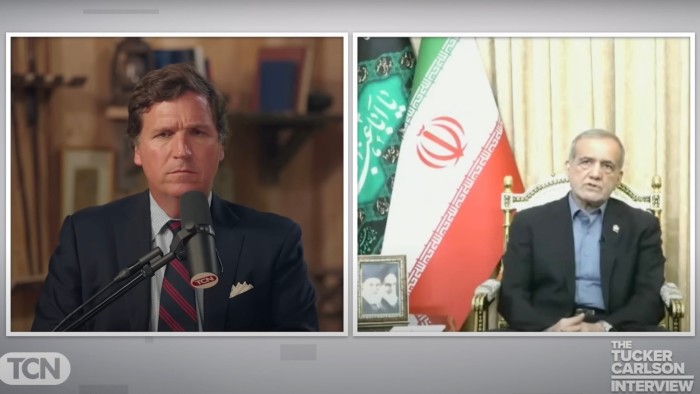Unlock the Editor’s Digest for free
Roula Khalaf, Editor of the FT, selects her favourite stories in this weekly newsletter.
Iran’s president Masoud Pezeshkian has said that Israel attempted to assassinate him during last month’s 12-day war between the two countries.
Pezeshkian made the claim in a video interview with American conservative media personality Tucker Carlson, during which he also signalled that Iran remains open to renewed diplomacy with the US over the Islamic republic’s nuclear programme.
When asked by Carlson whether Israel had tried to kill him, Pezeshkian responded: “They did try, yes, and they acted accordingly, but they failed.”
He said the attempt occurred while he was in a meeting “discussing the ways to move forward”, and suggested Israeli forces were tipped off by “intelligence by the spies”.
“They tried to bombard the area that we were holding that meeting,” he said, without offering specifics on the timing or how close the attack came to him. Pezeshkian’s comments were translated into English by an interpreter.
Israel began its offensive on Iran with devastating bombing raids in which it killed dozens of top military commanders and nuclear scientists. The US also launched an attack on Iran’s nuclear facilities during the war, which ended with a ceasefire last month.
During the conflict, Israel’s Prime Minister Benjamin Netanyahu said that he could consider assassinating Iran’s Supreme Leader Ayatollah Ali Khamenei. However, US President Donald Trump claimed that he had intervened to prevent such an action.
Khamenei, whose whereabouts during the fighting were unclear, attended a religious ceremony over last weekend in his first public appearance since the war began. His aides maintain that he continued to direct the war effort and made key strategic decisions throughout the conflict.
During the interview with Carlson, Pezeshkian vowed to give “life and blood” for Iran.
Pezeshkian, who refrained from accusing Washington of involvement in the alleged assassination attempt, did not rule out new negotiations with the US but expressed scepticism about their prospects.
Prior to the outbreak of war, Tehran had engaged in five rounds of indirect negotiations with Washington over the future of its nuclear programme. A sixth round was scheduled to begin in Oman shortly after Israel’s attack.
“There is no problem to restart talks with the US,” Pezeshkian told Carlson, but added: “How are we going to trust the US again? . . . How can we know for sure that in the middle of the talks the Israeli regime will not be given the permission again to attack us?”
While the Israeli and US strikes dealt severe blows to the Iranian military and regime, there have been conflicting accounts of how far they set back Tehran’s nuclear programme.
While Trump claimed the programme — which Washington warns could be weaponised — had been “obliterated”, the head of the UN’s nuclear watchdog said last month Iran could restart uranium enrichment “in a matter of months”.
Iran insists its nuclear programme is for peaceful purposes.
Pezeshkian levelled strong criticism at what he described as Israeli war crimes during the conflict. He said that Israeli forces had targeted military commanders while they were off duty, and killed nuclear scientists along with their families and other civilians.
“Because they wanted to kill one person, they had to demolish and destroy a whole building and as a result a lot of people were killed,” he said.
Israeli officials said Iran’s missiles also hit residential buildings in Israel. The IDF did not immediately respond to a request for comment.



